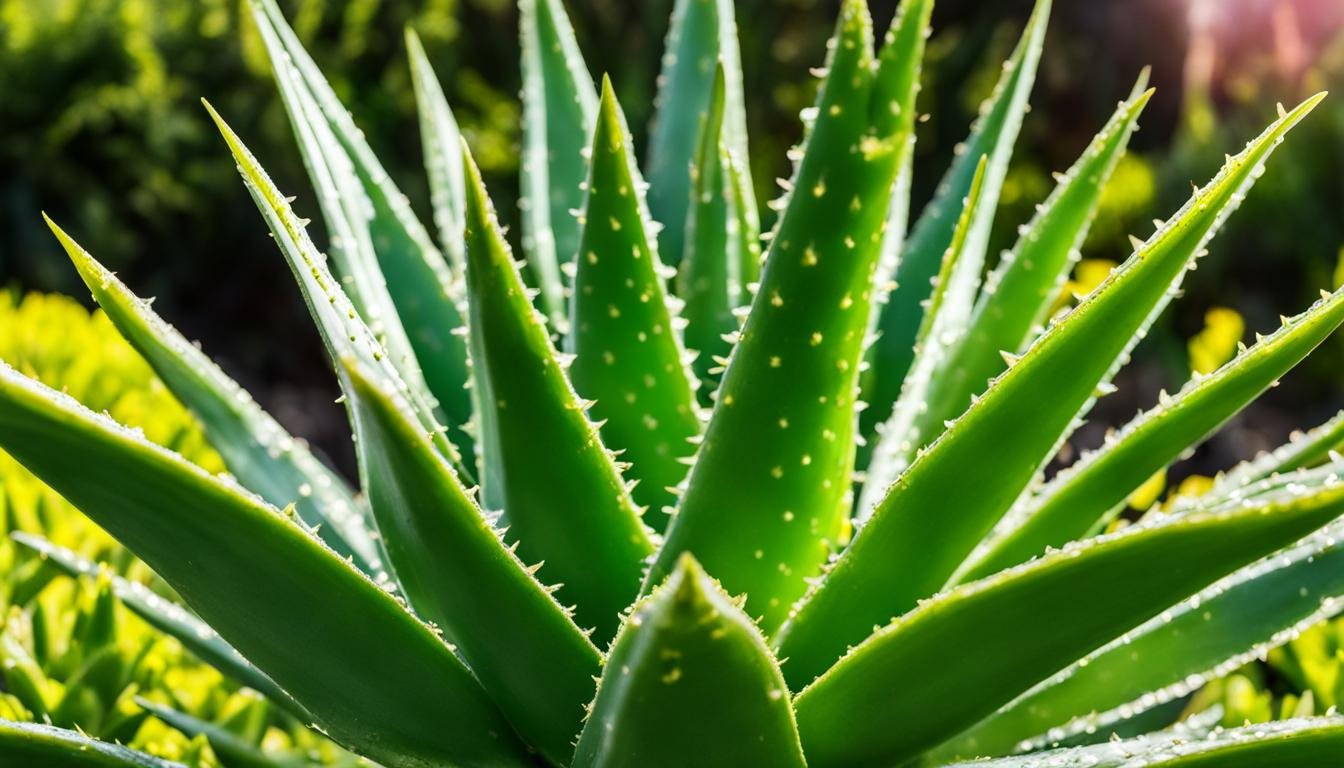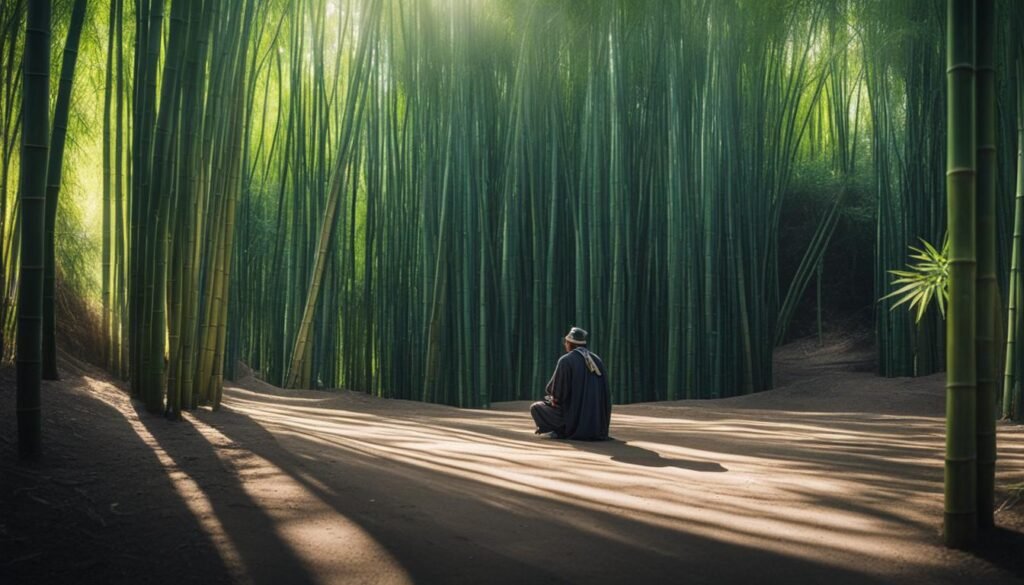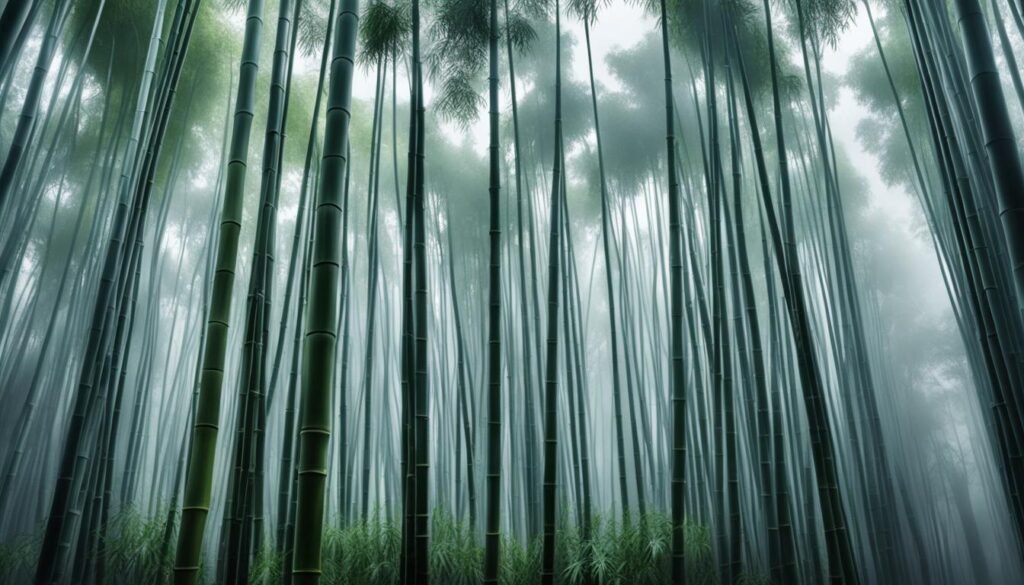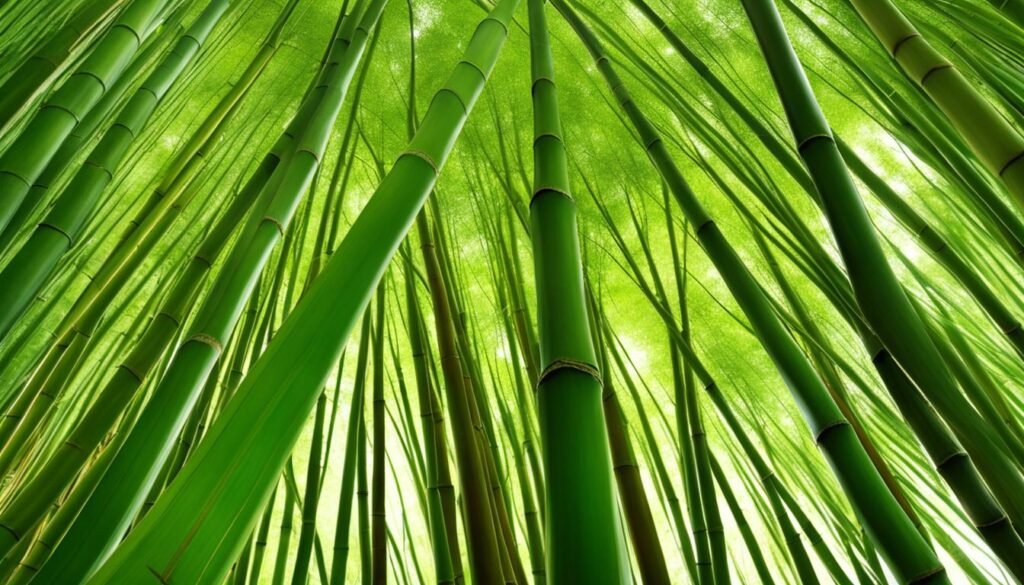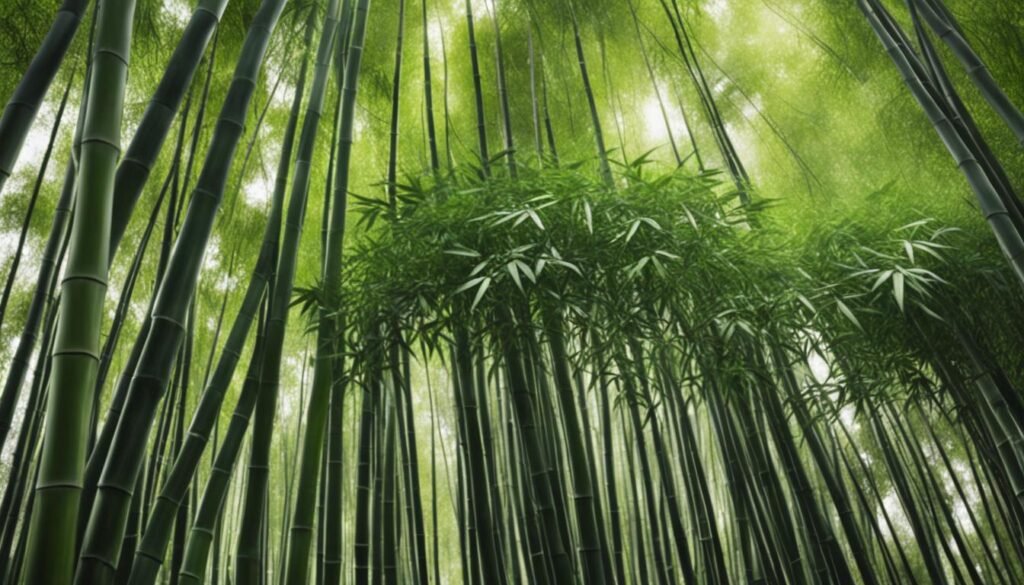Welcome to the captivating world of aloe myths and legends tales. Join me on a journey through time and across cultures as we unravel the intriguing stories surrounding the mythical properties of aloe vera. Throughout history, aloe plants have been steeped in folklore and mysticism, holding a significant place in traditional beliefs and narratives.
Ancient civilizations revered aloe vera as the “plant of immortality,” attributing it with healing powers and supernatural abilities. From ancient Egypt, where it was used by gods and goddesses to heal wounds, to African tribes who believed it could ward off evil spirits, aloe has played a prominent role in spiritual and mystical practices.
Key Takeaways:
- Aloe plants have a long history of being associated with myths and legends tales.
- Ancient cultures believed in the supernatural properties of aloe vera.
- Aloe is revered in African, Asian, and Native American folklore and traditions.
- Aloe vera’s symbolism includes purity, protection, and healing.
- Modern science has uncovered many actual benefits of aloe vera.
The Origins of Aloe Myths and Legends
In exploring the fascinating world of aloe myths and legends, it is essential to understand their ancient origins. Aloe vera, with its remarkable healing properties, has captured the imagination of cultures throughout history. From ancient Egypt to Greek and Roman mythology, tales of aloe’s mythical powers have been passed down through generations, intertwining folklore and the natural world.
In ancient Egypt, aloe vera was considered the “plant of immortality,” a testament to its revered status and extraordinary healing abilities. Egyptian mythology tells stories of the gods and goddesses using aloe to heal wounds and promote longevity. Similar beliefs in the magical properties of aloe can also be found in other cultures, such as Greek and Roman mythology, where aloe was associated with beauty, protection, and wellness.

| African Folklore and Traditions | Significance |
|---|---|
| Burning aloe leaves | Believed to ward off evil spirits and bring protection |
| Planting an aloe leaf upside down | Thought to bring rain as a symbol of prosperity |
| Aloe in traditional remedies | Used for its healing and moisturizing properties |
| Aloe in spiritual rituals | Viewed as a purifying and cleansing agent |
Aloe in Asian Folklore and Beliefs
In Asian folklore and beliefs, aloe vera holds a significant place, with its legendary stories captivating the imagination of many. In Chinese folklore, aloe is associated with beauty and is believed to have the power to enhance one’s appearance. This belief has led to the use of aloe in traditional medicine and skincare routines in many Asian countries for centuries. The remarkable ability of aloe to promote youthful and radiant skin has made it a beloved ingredient in numerous beauty products.
Asian cultures have long held traditional beliefs about the mythical properties of aloe. Its legendary reputation as a plant with healing powers has been passed down through generations, making it an integral part of cultural traditions. The stories surrounding aloe are a testament to its symbolization of beauty, renewal, and the cycle of life.
“Aloe vera is believed in Chinese folklore to possess the power to enhance one’s appearance, making it a cherished ingredient in skincare routines.”
The Beauty Elixir of Asia
Aloe’s presence in Asian folklore is a testament to its enduring significance. The belief in its mythical properties has transcended time and continues to influence modern perceptions and uses of aloe. Today, aloe vera is still celebrated for its various benefits, including its soothing and moisturizing properties. Its rich history in Asian folklore adds to its allure as a cherished plant that has stood the test of time.
The table below showcases the traditional beliefs about aloe in different Asian cultures:
| Asian Culture | Traditional Beliefs |
|---|---|
| Chinese | Aloe promotes beauty and enhances appearance. |
| Japanese | Aloe symbolizes purification and protection. |
| Korean | Aloe is considered a natural remedy for various ailments. |
In Summary
Aloe’s presence in Asian folklore and beliefs is a testament to its enduring significance in the region. From its association with beauty and appearance enhancement in Chinese folklore to its symbolism of purification and protection in Japanese culture, aloe holds a cherished place in the hearts of many. The traditional beliefs about aloe reflect its mythical qualities and the profound impact it has had on Asian cultures for centuries.

Aloe in Native American Mythology
In Native American mythology, aloe vera holds a sacred and powerful significance. Many tribes believe that aloe is a symbol of protection and healing, utilizing its mystical properties in various spiritual practices. One such belief is that burning aloe leaves can ward off evil spirits and bring good fortune.
For example, the Hopi tribe of the Southwestern United States celebrates the annual Aloe Ceremony, where they use aloe in purification rituals and prayers for healing. They believe that aloe has the ability to cleanse and purify both the body and the spirit, removing negative energies and promoting balance and well-being.
The stories and myths surrounding aloe in Native American cultures highlight the deep connection between nature and spirituality. Aloe is seen as a gift from Mother Earth, embodying her healing powers and serving as a reminder of the profound relationship between humans and the natural world.
Healing Rituals and Symbolism
Within Native American tribes, aloe is often used in healing rituals, both physical and spiritual. Aloe vera gel is applied topically to treat skin ailments, burns, and wounds, harnessing its soothing and rejuvenating properties. It is also consumed as a herbal remedy, known for its detoxifying and immune-boosting effects.
Additionally, aloe is seen as a symbol of resilience and adaptability. Just like the plant can thrive in harsh desert conditions, Native Americans believe that aloe teaches lessons of endurance and strength in the face of adversity. It is a reminder to stay rooted in one’s traditions, while also being open to growth and transformation.
| Tribe | Beliefs |
|---|---|
| Hopi | Aloe as a symbol of purification and healing |
| Navajo | Aloe used in medicinal remedies for various ailments |
| Cherokee | Aloe associated with protection and warding off negative energies |
“The stories and myths surrounding aloe in Native American cultures highlight the deep connection between nature and spirituality.”
Furthermore, aloe’s gel-like texture is seen as a representation of the fluidity and interconnectedness of life. Native American cultures often emphasize the importance of harmony and balance, and aloe serves as a symbol of these principles in their spiritual traditions.
The significance of aloe vera in Native American mythology showcases the enduring legacy of this remarkable plant. From its healing properties to its symbolism of protection and resilience, aloe continues to be revered as an integral part of spiritual practices and cultural traditions.
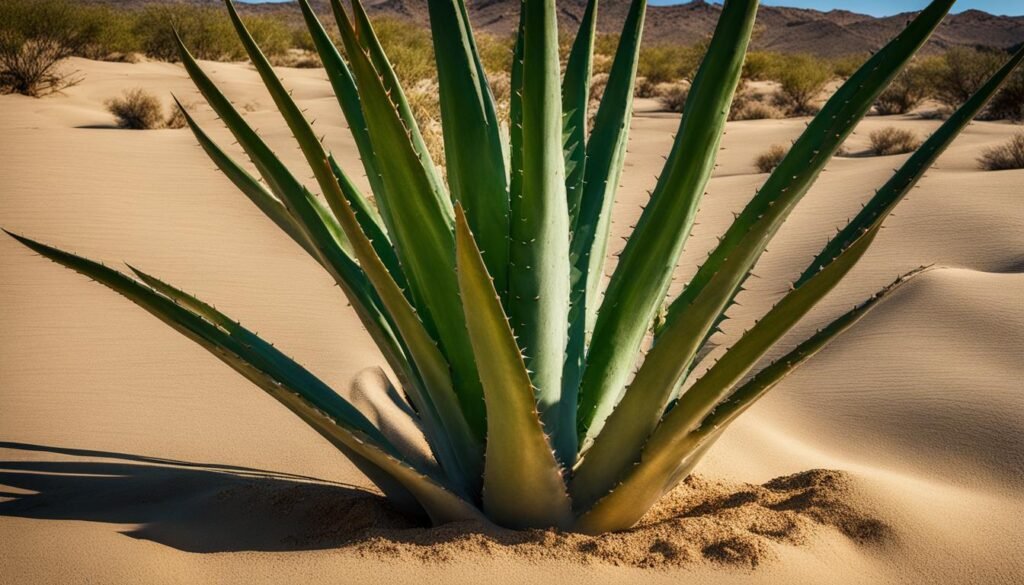
The Symbolism of Aloe in Cultural Traditions
Across various cultures, aloe vera has become a symbol of purity, protection, and healing. It is often associated with renewal, growth, and the cycle of life. This symbolism is reflected in the myths and legends that have been passed down through generations. The diverse cultural interpretations of aloe highlight its universal significance and the profound impact it has had on human beliefs and traditions.
In ancient Egypt, aloe vera was considered the “plant of immortality” and symbolized rebirth and eternal life. Egyptian mythology tells stories of the gods and goddesses using aloe to heal wounds and promote longevity. The ancient Egyptians’ reverence for aloe and its symbolism of renewal and healing laid the foundation for its cultural significance in other civilizations.
In African folklore, aloe is often seen as a guardian and protector. Some tribes believe that aloe plants are inhabited by ancestral spirits and that burning aloe leaves can ward off evil spirits. Aloe is also regarded as a symbol of protection and good luck in many African cultures. Its presence in rituals and traditions underscores its role as a symbol of spiritual and mystical powers.
“Aloe is like a shield, protecting us from harm and bringing blessings into our lives. Its presence in our rituals and ceremonies strengthens our connection to our ancestors and the spiritual realm.”
– Elder of an African tribe
In Asian cultures, aloe is associated with beauty and youthfulness. It is believed to have the power to enhance one’s appearance and promote radiant skin. Aloe has been used in traditional medicine and skincare routines in many Asian countries for centuries. Its legendary properties are seen as a reflection of its ability to promote physical rejuvenation and inner vitality.
Throughout history, aloe vera has transcended geographical boundaries, cultural differences, and time. Its symbolism in various cultural traditions underscores its enduring appeal and the universal themes it represents. Aloe’s significance as a symbol of purity, protection, and healing continues to captivate the human imagination and serves as a reminder of the profound connection between nature and humanity.
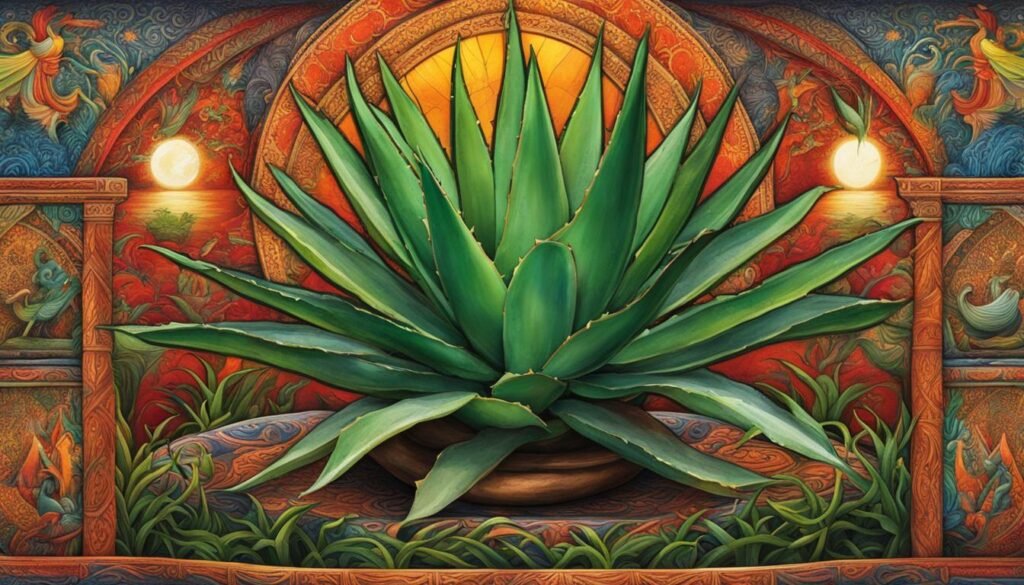
Modern Perceptions and Uses of Aloe
As we explore the captivating myths and legends surrounding aloe, it’s clear that this remarkable plant has left an enduring mark on human culture. But what about its role in modern times? How do we perceive and use aloe today? While some of the ancient beliefs and legends may have faded, the allure of aloe as a versatile and beneficial plant remains strong.
Beauty and Skincare
One of the most prominent uses of aloe in the modern world is in beauty and skincare products. Aloe vera’s soothing and moisturizing properties make it a popular ingredient in lotions, creams, and serums. Its ability to hydrate the skin and reduce inflammation has earned it a reputation as a natural remedy for sunburns and other skin irritations. Many people also use aloe gel directly from the plant as a homemade face mask or hair treatment.
Health and Wellness
Aloe vera is not only valued for its external benefits but also for its potential internal health benefits. Some studies suggest that consuming aloe juice or supplements may have digestive and immune-boosting properties. However, it’s important to note that more research is needed to fully understand the potential health benefits of consuming aloe.
| Modern Uses of Aloe | Benefits |
|---|---|
| Skincare | Moisturizes, soothes, and reduces inflammation |
| Health and wellness | Possible digestive and immune-boosting properties |
| Home remedies | Treats minor burns, cuts, and insect bites |
Home Remedies
Aloe vera’s healing properties also make it a popular choice for natural home remedies. The gel from the plant is often used to treat minor burns, cuts, and insect bites. Its cooling and soothing effects can provide relief and aid in the healing process. However, it’s important to consult a healthcare professional for more severe injuries or medical conditions.
Exploring the Science Behind Aloe’s Benefits
While aloe vera has been surrounded by myths and legends throughout history, its mythical properties are not the only reason it has captured the imagination of so many. Science has uncovered many actual benefits of aloe vera, shedding light on its remarkable healing properties and its potential for skincare and medicinal use.
Aloe vera has been found to possess anti-inflammatory, antibacterial, and moisturizing properties, making it a valuable ingredient in skincare products. Its ability to soothe irritated skin, reduce redness, and promote wound healing has been scientifically proven. Studies have also explored its potential in treating burns and soothing sunburns due to its cooling and moisturizing effects. The soothing and healing properties of aloe vera make it a trusted companion when it comes to skincare and treating skin ailments.
Furthermore, aloe vera is rich in vitamins, minerals, and antioxidants that contribute to its beneficial effects on the skin. These antioxidants help protect the skin against free radicals and environmental damage, promoting a healthy and youthful appearance. Aloe vera’s moisturizing properties also make it an effective ingredient in hydrating and nourishing the skin, helping to maintain its elasticity and prevent dryness.

Additionally, aloe vera has been studied for its potential medicinal uses beyond skincare. Research suggests that aloe vera may have anti-inflammatory effects on internal organs and may contribute to digestive health. Some studies have also explored its potential in managing blood sugar levels and supporting a healthy immune system. While more research is needed in these areas, the findings so far provide a promising glimpse into the potential health benefits of aloe vera.
Overall, the scientific research on aloe vera confirms many of the legendary properties attributed to this remarkable plant. Its healing, moisturizing, and soothing effects make it a valuable asset in skincare and potentially in other areas of health and wellness. With a balance between myth and science, aloe vera continues to captivate our imagination and inspire further exploration into the wonders of nature.
Aloe’s Cultural Significance Today
In today’s modern world, aloe vera continues to hold immense cultural significance across various regions and communities. The legends and folklore surrounding aloe have been passed down through generations, keeping alive the deep-rooted connection between humans and the natural world. Aloe’s mythical properties and traditional beliefs surrounding its healing powers have become an integral part of spiritual and traditional practices.
To this day, certain regions organize aloe vera festivals and rituals, where the plant is celebrated for its mystical qualities. These gatherings serve as a reminder of the enduring power of folklore and the ways in which nature has inspired human imagination. The stories and beliefs surrounding aloe pay homage to the profound impact that plants can have on our lives and the wonders of the natural world.
Aloe’s cultural significance extends beyond rituals and festivals. It has also found its way into popular culture and media, further solidifying its place in our collective consciousness. Whether it’s through literature, films, or artwork, aloe often symbolizes healing, rejuvenation, and transformation. Its presence in popular culture reflects its enduring status as a beloved and revered plant that has captivated people’s imagination for centuries.
The Enduring Symbolism of Aloe
Throughout history, aloe vera has been embraced as a symbol of purity, protection, and healing. Its revered status in various cultures highlights its universal significance and the profound impact it has had on human beliefs and traditions. Aloe’s ability to bridge the gap between past and present, science and folklore, makes it a symbol of the timeless connection between humans and the natural world.
“Aloe’s enduring cultural significance reminds us of the magic and wonder that can be found in the legends and folklore that surround us.”
Aloe’s Legacy for Future Generations
As we continue to unravel the mysteries of the natural world, aloe’s cultural significance serves as a reminder of the enduring influence of folklore. It reminds us of the intrinsic human need for stories and beliefs that connect us to the wonders of nature. Aloe’s legacy lies not only in its healing properties but also in its ability to inspire awe and wonder, igniting our curiosity and deepening our appreciation for the intricacies of the natural world.
| Region | Cultural Significance |
|---|---|
| Africa | Aloe is believed to ward off evil spirits and bring good luck. |
| Asia | Aloe is associated with beauty and enhancing one’s appearance. |
| Native American | Aloe is considered sacred and symbolizes protection and healing. |
Table: Aloe’s Cultural Significance by Region
As we pass down the stories and legends of aloe to future generations, we ensure that the awe-inspiring beauty and power of Mother Nature are preserved and celebrated. Aloe’s cultural significance serves as a reminder of the intricate relationship between humans and the natural world and the wisdom that can be gained from our connection to the wonders of the Earth.
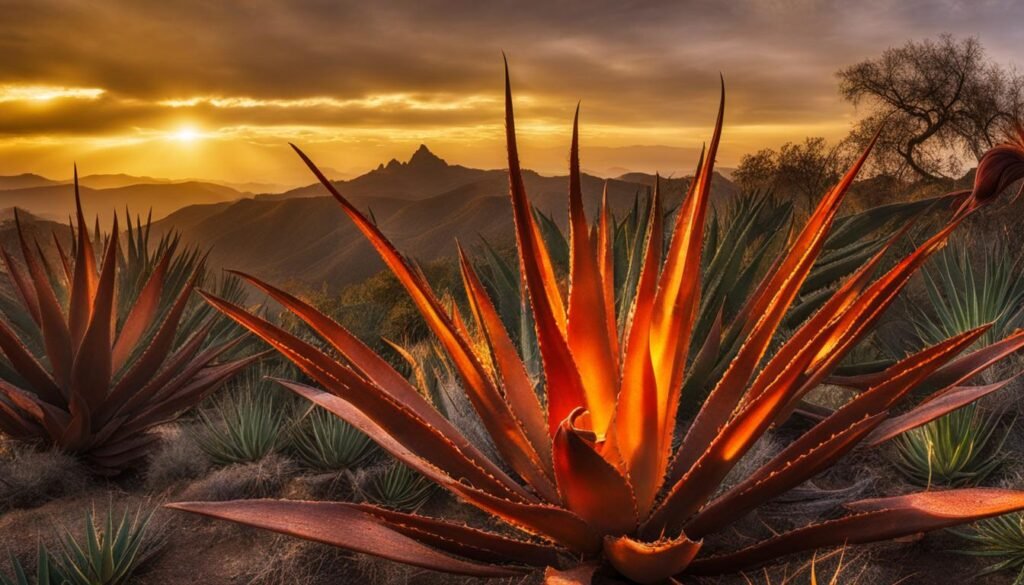
Aloe in Popular Culture and Media
The enchanting allure of aloe vera has transcended ancient legends and entered the realm of popular culture and media. From literature and films to artworks and advertisements, aloe’s mythical qualities have captivated audiences and served as a symbol of healing, rejuvenation, and transformation.
Aloe’s presence can be found in various forms of creative expression. In literature, it has been used as a metaphor for resilience and growth, symbolizing the ability to overcome adversity and thrive in challenging circumstances. Films often depict aloe as a mystical plant with extraordinary powers, representing hope, restoration, and the triumph of good over evil.
Artists have also been inspired by the beauty and symbolism of aloe vera. Paintings and sculptures featuring aloe often evoke a sense of tranquility, purity, and the wonders of nature. Aloe’s striking leaves and vibrant green color make it a visually captivating subject, while its mythical associations add depth and intrigue to artistic interpretations.
“Aloe vera is like a character in its own right, with its own story to tell. It has this mysterious aura that draws people in and sparks their imagination. When I paint aloe, I try to capture its essence and the powerful emotions it evokes.” – Artist
Aloe’s Influence on Advertising and Branding
In the world of advertising and branding, aloe vera has become synonymous with natural wellness, purity, and beauty. Many skincare and beauty companies incorporate aloe into their products, leveraging its mythical and scientific reputation to attract consumers. Aloe’s association with healing and rejuvenation resonates with individuals seeking natural remedies and holistic solutions for their well-being.
- Table 1: Aloe in Popular Culture and Media
| Medium | Representation |
|---|---|
| Literature | Aloe as a symbol of resilience and growth |
| Films | Aloe as a mystical plant with extraordinary powers |
| Artworks | Aloe as a subject of tranquility and natural wonders |
| Advertising | Aloe as a symbol of natural wellness and beauty |
As aloe continues to be celebrated and embraced in popular culture and media, its enduring appeal as a mythical plant remains strong. Through various creative forms, aloe vera continues to inspire and captivate audiences, reminding us of the deep-rooted connection between nature, storytelling, and our collective imagination.
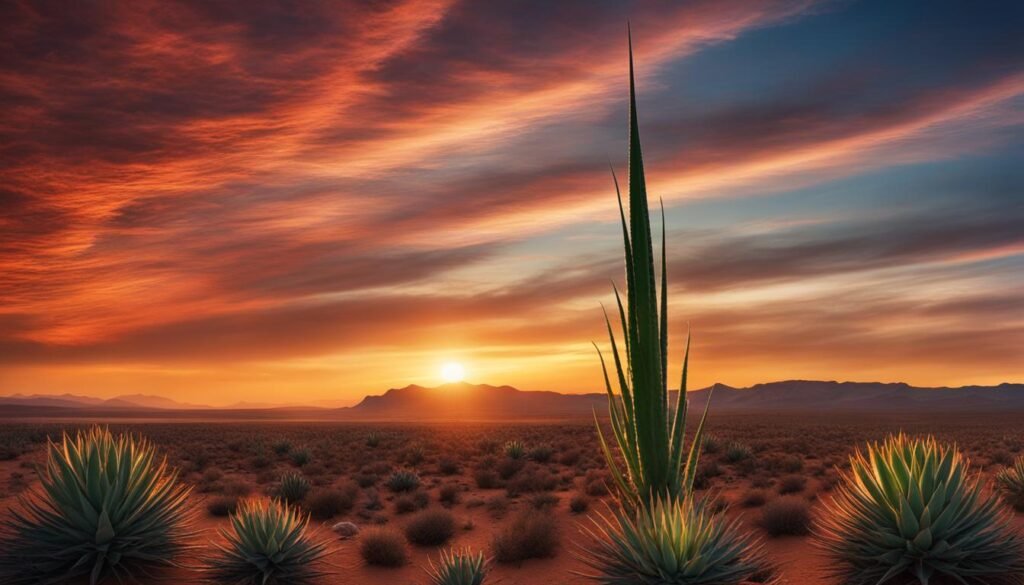
Aloe Legends Around the World
As we explore the rich tapestry of aloe legends and folklore, we uncover a world of captivating stories and beliefs that span across different cultures and civilizations. From ancient Egypt to modern-day Asia, aloe has been enshrined in myths and legends, celebrated for its healing powers and revered as a symbol of protection and rejuvenation.
Let’s take a journey through the myths and legends surrounding aloe, starting with its origins in ancient Egypt. In Egyptian mythology, aloe vera was known as the “plant of immortality” and was believed to possess magical healing properties. Stories of gods and goddesses using aloe to heal wounds and grant eternal life have been passed down through generations, cementing its place in Egyptian folklore.
Across the African continent, aloe plays a prominent role in various tales and traditions. Some African tribes believe that aloe plants are inhabited by ancestral spirits and burning aloe leaves can ward off evil. Aloe is seen as a symbol of protection and good luck, connecting communities to their spiritual roots and cultural heritage.
“Aloe vera, a plant steeped in history and myth, represents the enduring fascination humans have with the natural world and its transformative powers.”
In Asian folklore, aloe takes on a different meaning. In Chinese mythology, it is associated with beauty and youthfulness. Aloe has been used for centuries in traditional medicine and skincare practices, believed to enhance one’s appearance and promote radiant skin. These legends reflect the cultural significance of aloe in Asia and its enduring appeal in modern beauty rituals.
The Native American tribes also have their own myths and stories surrounding aloe. It is regarded as a sacred plant, believed to possess healing and protective powers. Aloe is seen as a symbol of strength and resilience, connecting Native American communities to their spirituality and the natural world.
Table: Legends of Aloe Around the World
| Region | Legend |
|---|---|
| Egypt | The plant of immortality, used by gods for healing and eternal life. |
| Africa | Aloe is believed to be inhabited by ancestral spirits and can ward off evil. |
| China | Aloe is associated with beauty and youthfulness, enhancing one’s appearance. |
| Native American | A sacred plant, believed to possess healing and protective powers. |
These aloe legends and folklore tales from around the world serve as a testament to the enduring power of nature and the human fascination with its mysteries. They remind us of the deep-rooted connections between cultures and the shared belief in the transformative properties of aloe vera. As we delve into these stories, we gain a greater appreciation for the wonders of the natural world and the profound impact it has on our lives.
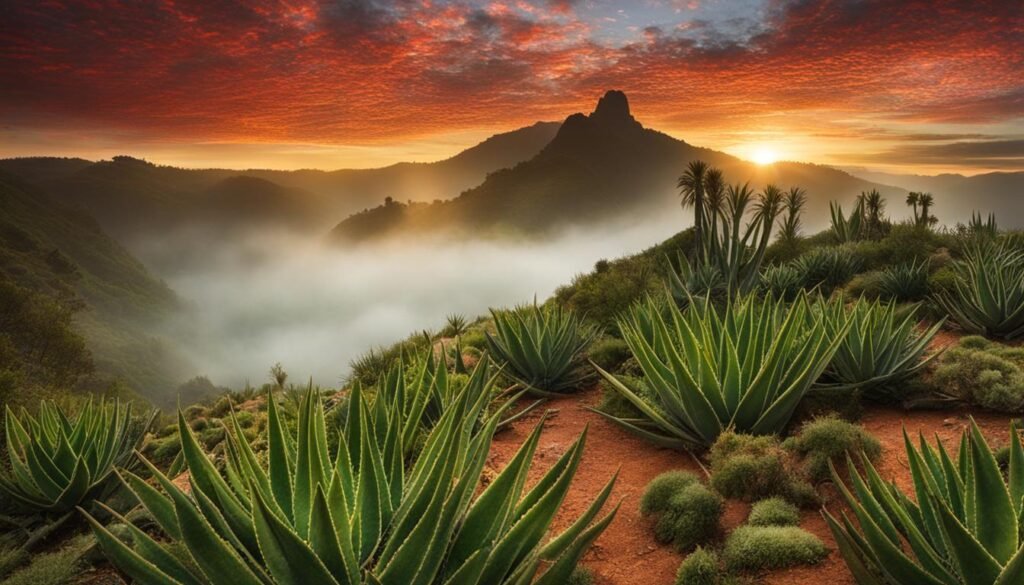
The Enduring Fascination with Aloe
The captivating allure of aloe and its myths and legends tales have mesmerized cultures around the world for centuries. The timeless tales and folklore related to aloe plants have woven a rich tapestry of beliefs and traditions, reflecting the enduring power of storytelling and the human fascination with the natural world.
Aloe’s ability to bridge the gap between past and present, science and folklore, is a testament to its enduring appeal.
Throughout history, aloe has been celebrated for its mythical properties. From ancient Egyptian tales of immortality to African folklore of spiritual protection, aloe has held a significant place in cultural narratives and beliefs. Its symbolism as a symbol of healing, purity, and renewal has transcended borders and continues to inspire awe and admiration.
- Aloe myths and legends tales have fascinated cultures around the world.
- Aloe’s enduring appeal lies in its ability to connect ancient beliefs with modern understanding.
- Aloe’s mystical qualities and symbolism have captivated the human imagination throughout history.
Even in today’s modern society, aloe’s allure remains strong. Its mythical reputation has been complemented by scientific research, which has unraveled some of its actual benefits. Aloe vera’s anti-inflammatory, antibacterial, and moisturizing properties have made it a sought-after ingredient in skincare products and natural remedies.
| Benefits of Aloe Vera | Mythical Properties |
|---|---|
| Soothes sunburns | Used by ancient Egyptians to heal wounds |
| Promotes wound healing | Considered a plant of immortality by ancient Egyptians |
| Moisturizes the skin | Believed to possess supernatural healing powers in Greek mythology |
The enduring fascination with aloe and its mythical qualities is a testament to the power of folklore. As we delve into the rich tapestry of aloe myths and legends tales, we are reminded of the captivating magic and wonder that can be found in the stories and beliefs that surround us.
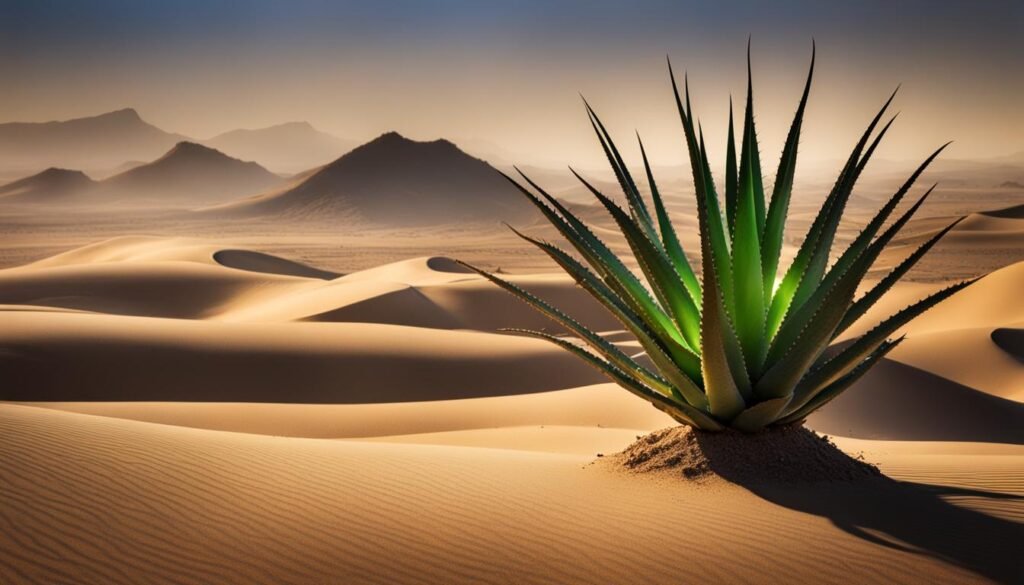
Aloe’s Legacy in Unveiling Natural Wonders
Aloe vera’s rich folklore and mystical tales have left an indelible mark on human culture, weaving a tapestry of myths and legends surrounding this remarkable plant. These captivating stories showcase the enduring power of folklore and the deep-rooted connection between humans and nature. As we delve into the enchanting world of aloe vera folklore, we unlock the secrets of Mother Nature and uncover the wonders she has bestowed upon us.
In cultures around the world, aloe vera is revered as a symbol of purity, protection, and healing. Its ability to heal wounds, soothe skin, and promote wellness has been celebrated for centuries. From ancient Egypt’s belief in aloe’s immortality to Native American tribes’ use of aloe for spiritual protection, these stories highlight the profound impact plants can have on our lives and our collective imagination.
“The power of nature is truly awe-inspiring, and aloe vera embodies this in its mythical qualities,” says Dr. Emily Greenfield, a folklore expert.
“Through storytelling and the passing down of legends, we are reminded of the magic and wonder that can be found in the legends and folklore that surround us. Aloe’s legacy in unveiling natural wonders reminds us of our deep connection to the natural world and the treasures it holds.”
In a fast-paced world driven by modern science and technology, these mythical tales allow us to reconnect with our roots and appreciate the awe-inspiring beauty of the natural world.
| Legend | Origin | Significance |
|---|---|---|
| Aloe as the “Plant of Immortality” | Ancient Egypt | Believed to possess healing powers and promote longevity |
| Aloe as a Symbol of Protection | African folklore | Thought to ward off evil spirits and bring good luck |
| Aloe as a Beauty Elixir | Asian cultures | Associated with enhancing appearance and promoting youthful skin |
| Aloe as a Sacred Plant | Native American mythology | Regarded as a symbol of healing and spiritual protection |
As we continue to explore the intricacies of aloe’s legacy and the myths and legends that surround it, we are reminded of the profound impact nature has on our lives. Whether it’s through the healing properties of aloe vera or the captivating stories passed down through generations, we find ourselves in awe of the wonders that the natural world has to offer. Aloe’s legacy serves as a reminder that, even in our modern world, nature continues to inspire, heal, and captivate our imagination.
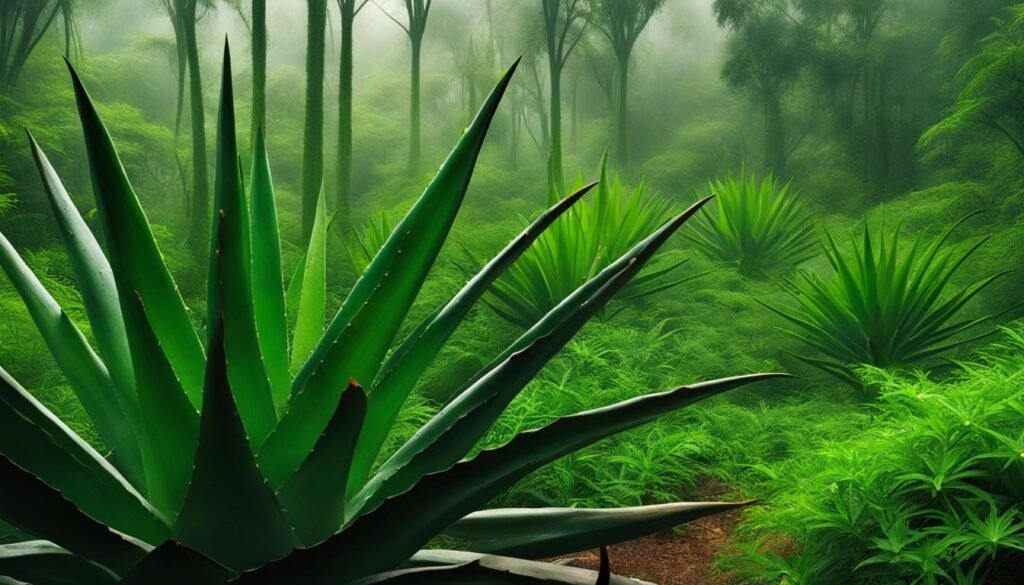
| Culture | Myth/Legend |
|---|---|
| Egyptian | Aloe vera as the “plant of immortality” with healing powers. |
| Greek and Roman | Belief in the magical properties of aloe. |
| African | Aloe as a symbol of protection and good luck. |
| Asian | Aloe associated with beauty and promoting youthful skin. |
| Native American | Aloe as a sacred and powerful plant for protection and healing. |
Conclusion
As we dove into the captivating world of aloe legends and folklore, we discovered a rich tapestry of stories that span across time and cultures. These mythical tales surrounding aloe vera have left an indelible mark on the human imagination, reminding us of the magic and wonder that can be found in the legends and folklore that surround us.
From ancient civilizations like Egypt and Greece, to African tribes and Native American cultures, aloe has held a profound significance as a symbol of healing, protection, and spiritual power. The diverse interpretations and beliefs surrounding aloe highlight its universal appeal and its ability to bridge the gap between the natural world and human culture.
While modern science has shed light on the actual benefits of aloe vera, its mythical properties continue to capture our fascination. Aloe’s enduring legacy is a testament to the timeless power of storytelling and the intrinsic connection between humans and nature. The myths and legends surrounding aloe serve as a reminder of the awe-inspiring beauty and power of Mother Nature.
So, whether we apply aloe for its skincare benefits or embrace its mythical qualities in our cultural traditions, the enchanting allure of aloe vera continues to captivate our hearts and minds. Let us cherish these ancient tales and celebrate the wonders of the natural world, for in them lies the essence of our shared human experience.
FAQ
What are the origins of aloe myths and legends?
Aloe myths and legends can be traced back thousands of years, with ancient civilizations like Egypt, Greece, and Rome attributing healing and supernatural powers to aloe vera.
How is aloe represented in African folklore?
In African folklore, aloe is believed to ward off evil spirits and is regarded as a symbol of protection and good luck. Some tribes also believe that aloe plants are inhabited by ancestral spirits.
What are the beliefs surrounding aloe in Asian cultures?
In Asian folklore, aloe is associated with beauty and is believed to enhance one’s appearance. It has been used in traditional medicine and skincare routines for centuries in many Asian countries.
How is aloe depicted in Native American mythology?
Aloe is considered a sacred and powerful plant in Native American mythology. It is believed to have healing properties and can ward off evil spirits, bringing protection and good fortune.
What does aloe represent in cultural traditions?
Aloe is symbolically associated with purity, protection, and healing in various cultures around the world. It often represents renewal, growth, and the cycle of life.
What are the modern uses of aloe?
Aloe is widely used in skincare, beauty products, and natural remedies for its healing properties. It is celebrated for its moisturizing, anti-inflammatory, and antibacterial effects.
What scientific benefits does aloe vera have?
Research has shown that aloe possesses anti-inflammatory, antibacterial, and moisturizing properties. It has been studied for its potential in treating burns, soothing sunburns, and promoting wound healing.
How is aloe culturally significant today?
Aloe still holds cultural significance in certain regions, with festivals and rituals dedicated to celebrating its mythical qualities and spiritual connections.
How does aloe appear in popular culture and media?
Aloe is often depicted in literature, films, and artwork, symbolizing healing, rejuvenation, and transformation. It has become a beloved and revered plant in popular culture.
What is the enduring fascination with aloe?
Aloe’s enduring appeal lies in its ability to bridge the gap between ancient folklore and modern science. It continues to captivate our imagination with its mythical qualities and healing properties.
What is aloe’s legacy and significance in unveiling natural wonders?
Aloe serves as a reminder of the wonders of the natural world and the power plants can have on our lives. Its ability to heal, soothe, and inspire awe showcases the beauty and power of Mother Nature.
What does exploring aloe myths and legends unveil?
Exploring aloe myths and legends takes us on a journey through time and cultures, revealing the intricate relationship between humans and the natural world. It showcases the human fascination with nature’s mysterious and transformative powers.
